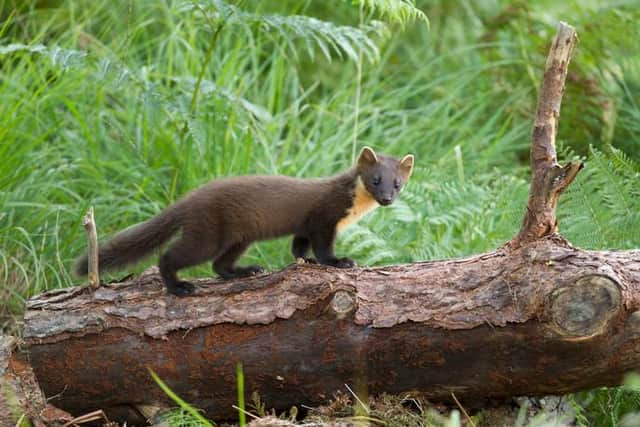Plans to release rare pine martens into Derbyshire countryside take a step forward
and live on Freeview channel 276
Pine martens are about the size of a cat and have chestnut brown fur with a creamy yellow bib over the throat and chest. They are related to weasels, ferrets, polecats and otters.
This rare animal was once the second most common carnivore in Britain, but loss of habitat, the fur industry and culling has driven the species close to extinction in England. The last confirmed sighting of a pine marten was in 2018 when one was found by the side of the road between Belper and Ripley. Prior to that, the last sighting, according to the Derbyshire Mammals Directory, was in 2002.
MORE WILDLIFE NEWS: Peregrine falcon found nesting at top of Chesterfield's Crooked Spire


Advertisement
Hide AdAdvertisement
Hide AdDerbyshire Wildlife Trust has just announced they have recruited a member of staff dedicated to pine martens thanks to funding from the Government’s Green Recovery Challenge Fund.
This new role seeks will see the Trust carry out feasibility studies to see if it is possible to reintroduce pine martens here. The studies will include looking at the numbers that could be sustained, the best locations and mapping out which woodlands need to be more connected in order to help pine martens thrive. The Trust hopes to reintroduce pine martens if the feasibility studies are successful.
Hollie Fisher at Derbyshire Wildlife Trust said, “We would love to see pine martens return to Derbyshire. Pine martens need woodlands that are well connected and full of a mixture of species and food sources such as small rodents, birds, eggs, insects and fruit in order to thrive. We’re working hard to ensure there are more, connected, wild places across Derbyshire for these special mammals, especially within the Dark Peak and lower Derwent Valley.”
This role is funded by the government’s Green Recovery Challenge Fund. The fund is being delivered by The National Lottery Heritage Fund in partnership with Natural England and the Environment Agency. It is one of four traineeships that offer a unique and exciting opportunity to undertake work-based training towards developing a career in the environmental sector as well as playing a key role in the operation of Derbyshire Wildlife Trust's current strategy, to bring nature back to at least 33% of Derbyshire by 2030.